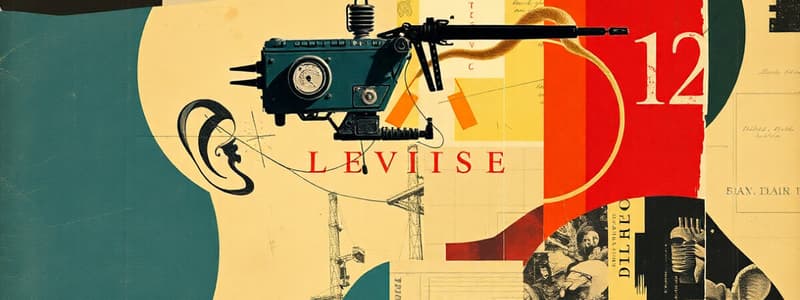Podcast
Questions and Answers
Define learning?
Define learning?
Learning is a relatively permanent change in behavior potential that occurs due to practice or experience.
What are the two theories that describe how people in organizations learn?
What are the two theories that describe how people in organizations learn?
- Operant learning and social learning (correct)
- Cognitive learning and social learning
- Classical conditioning and operant learning
- Social learning and classical conditioning
Reinforcement is the process by which stimuli strengthen behaviors.
Reinforcement is the process by which stimuli strengthen behaviors.
True (A)
What are the two types of Reinforcement?
What are the two types of Reinforcement?
Positive reinforcers work by their ______ to a situation.
Positive reinforcers work by their ______ to a situation.
Negative reinforcers work by their ______ from a situation.
Negative reinforcers work by their ______ from a situation.
An aversive stimulus is something that is undesirable and we naturally try to avoid.
An aversive stimulus is something that is undesirable and we naturally try to avoid.
Negative reinforcement is the process of removing an aversive stimulus following a behavior to increase the likelihood of that behavior occurring again.
Negative reinforcement is the process of removing an aversive stimulus following a behavior to increase the likelihood of that behavior occurring again.
Managers who continually nag/criticize their employees unless the employees work hard are attempting to use negative reinforcement.
Managers who continually nag/criticize their employees unless the employees work hard are attempting to use negative reinforcement.
What are three examples of Organizational Errors Involving Reinforcement?
What are three examples of Organizational Errors Involving Reinforcement?
Rewards can fail to serve as reinforcers when they are not made contingent on some specific desired behaviors.
Rewards can fail to serve as reinforcers when they are not made contingent on some specific desired behaviors.
The same reinforcer will work for all people.
The same reinforcer will work for all people.
What are two strategies that reduce the probability of learned behavior?
What are two strategies that reduce the probability of learned behavior?
Extinction involves removing the stimulus that causes unwanted behaviour.
Extinction involves removing the stimulus that causes unwanted behaviour.
What is punishment in operant learning?
What is punishment in operant learning?
In negative reinforcement, an aversive stimulus is applied to decrease the probability of a behavior.
In negative reinforcement, an aversive stimulus is applied to decrease the probability of a behavior.
Punishment can be an effective means of stopping undesirable behavior, but it must be applied very carefully.
Punishment can be an effective means of stopping undesirable behavior, but it must be applied very carefully.
When using punishment effectively, which of these steps should be avoided?
When using punishment effectively, which of these steps should be avoided?
Which of these is considered a safer strategy for managers than using punishment?
Which of these is considered a safer strategy for managers than using punishment?
Flashcards
Learning
Learning
A relatively permanent change in behavior potential that occurs due to practice or experience.
Operant Learning
Operant Learning
Learning where the subject/person learns to operate in the environment to achieve certain consequences.
Reinforcement
Reinforcement
The process by which stimuli strengthen behaviors.
Positive Reinforcement
Positive Reinforcement
Signup and view all the flashcards
Negative Reinforcement
Negative Reinforcement
Signup and view all the flashcards
Aversive Stimulus
Aversive Stimulus
Signup and view all the flashcards
Extinction
Extinction
Signup and view all the flashcards
Punishment
Punishment
Signup and view all the flashcards
Using Punishment Effectively
Using Punishment Effectively
Signup and view all the flashcards
Personality
Personality
Signup and view all the flashcards
Five-Factor Model of Personality
Five-Factor Model of Personality
Signup and view all the flashcards
Locus of Control
Locus of Control
Signup and view all the flashcards
Self-Monitoring
Self-Monitoring
Signup and view all the flashcards
Self-Esteem
Self-Esteem
Signup and view all the flashcards
Study Notes
Chapter 2: Personality and Learning
- Organizational behavior is influenced by learning and personality
- Learning is a relatively permanent change in behavior, potential resulting from practice or experience
- Learning excludes biological changes or temporary states (e.g., hunger, sneezing)
- Two types of learning are operant learning (self-learning) and social learning (learning via observation and imitation)
Operant Learning Theory
- Operant learning is where the subject learns how to interact in an environment to achieve desired consequences
- Operantly learned behavior is governed by the consequences that follow it
- The learner figures out the association between a behavior and its consequence
Reinforcement
- Reinforcement is crucial in shaping behavior
- Reinforcement is the process of prompting behavioral change via stimuli
- A reinforcer is a stimulus that augments or maintains a behavior's likelihood
Types of Reinforcement
- Positive reinforcement: Introducing a stimulus (often pleasant) after a behavior, strengthening its likelihood. Examples include praise, rewards, or bonuses.
- Negative reinforcement: Removing a stimulus (often unpleasant) after a behavior, increasing its likelihood. Examples include stopping nagging, avoiding a fine, or quieting a noisy environment.
Punishment
- Punishment is the application of an unpleasant stimulus to discourage unwanted behavior, decreasing its likelihood. An example includes a deduction in salary based on poor performance.
Using Punishment Effectively
- Carefully apply punishment
- Focus on positive reinforcement over punishment to improve behavior in general
- Consider if the punishment is aversive for the subject
- Administer the penalty swiftly
- Avoid group-based penalties
Organizational Errors in Reinforcement
- Confusing rewards with reinforcers: Rewards (like pay or bonuses) are not always connected to specific desired behaviors.
- Neglecting diversity in preferences for reinforcers: Reinforcers differ across individuals.
- Neglecting important sources of reinforcement: Managers may overlook important feedback, or grades for instance.
Studying That Suits You
Use AI to generate personalized quizzes and flashcards to suit your learning preferences.




